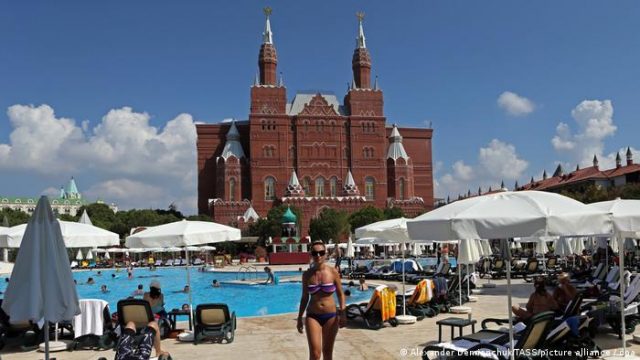[ad_1]
Despite the war in Ukraine, Turkey hopes to do business with many vacationers from Russia. It has therefore facilitated payments, money transfers and account access for Russian citizens.
Shortly after the Russian army’s attack on Ukraine, Elena arrives in Istanbul. She works in public relations for a Russian university. For this she does not need to live in Moscow, it can also be done online, says the Russian. The employer is not a problem if he speaks in the western media, Elena explains. But the Russian state is putting pressure on her, which is why she does not want her last name published.
She has an apartment in Moscow, so she will definitely need to go back there. But for now, she prefers to stay in Turkey, as Vladimir Putin’s government apparatus becomes increasingly repressive.
ATM withdrawals work
Since Elena is in Istanbul, she has to think about how to transfer her salary to Istanbul, which is paid in rubles, the Russian currency. It has two credit cards that are part of the Russian Mir payment system. She could use them to withdraw money in Istanbul from vending machines connected to the payment system in question. ATMs of some banks accept withdrawals with Russian cards. Other Turkish banks, in which foreign financial institutions have shares, seem to be more cautious due to sanctions.
Nurredin Nebati, Turkey’s Finance Minister, has promised Russian travelers in Turkey that they will have no problem paying with Mir cards in Turkey this season. However, in April, Ukraine’s central bank called on Turkey to stop accepting payments through the Mir system.
Credit Card Alternatives Mir
There are alternatives to credit cards. Elena opened an investment account in a Turkish bank and it is very easy if she invests enough money, she says.

Through this account, it can transfer money from Russia to Turkey. Up to US $ 50,000.
And at the end is Koronapay, adds Elena. A payment system widely used in the countries of the former Soviet Union, such as Western Union, the American provider of international transfers. If many Russians were to line up outside the Turkish post office, they would receive money from Koronapay, says the Russian living in Istanbul.
Russians in Turkey are not afraid of their ruble accounts
Since the beginning of the war, Turkey has been a country where Russian citizens do not have to worry about losing access to their ruble accounts. Putin’s critics are certainly not the only ones who have recorded him. According to the online newspaper Duvar English, wealthy Russians poured money into the Turkish real estate market after the Russian occupation of Ukraine. In April, the purchase of real estate by the Russians doubled compared to a month ago. The latter are the main foreign buyers.
In 2021, Turkey received 4.7 million Russian tourists, the highest number of any country. Despite Western sanctions, President Recep Tayyip Erdogan is working hard to ensure that Russian holidaymakers can continue to relax on the Turkish Riviera in 2022.
The attempt by Turkish companies to expand their business with Russian passengers is likely a reaction to sanctions against Russian airlines, which have so far brought Russians to Turkey. But at the same time, Russian Aeroflot airlines continue flights between Moscow and Istanbul.
Elena reveals that her mother had arrived a few days earlier with Aeroflot. She just had to fly an hour longer because Ukrainian airspace is closed. Holidays for Russian tourists on the Turkish Riviera seem safe – despite sanctions./DW/
top channel
[ad_2]
Source link















